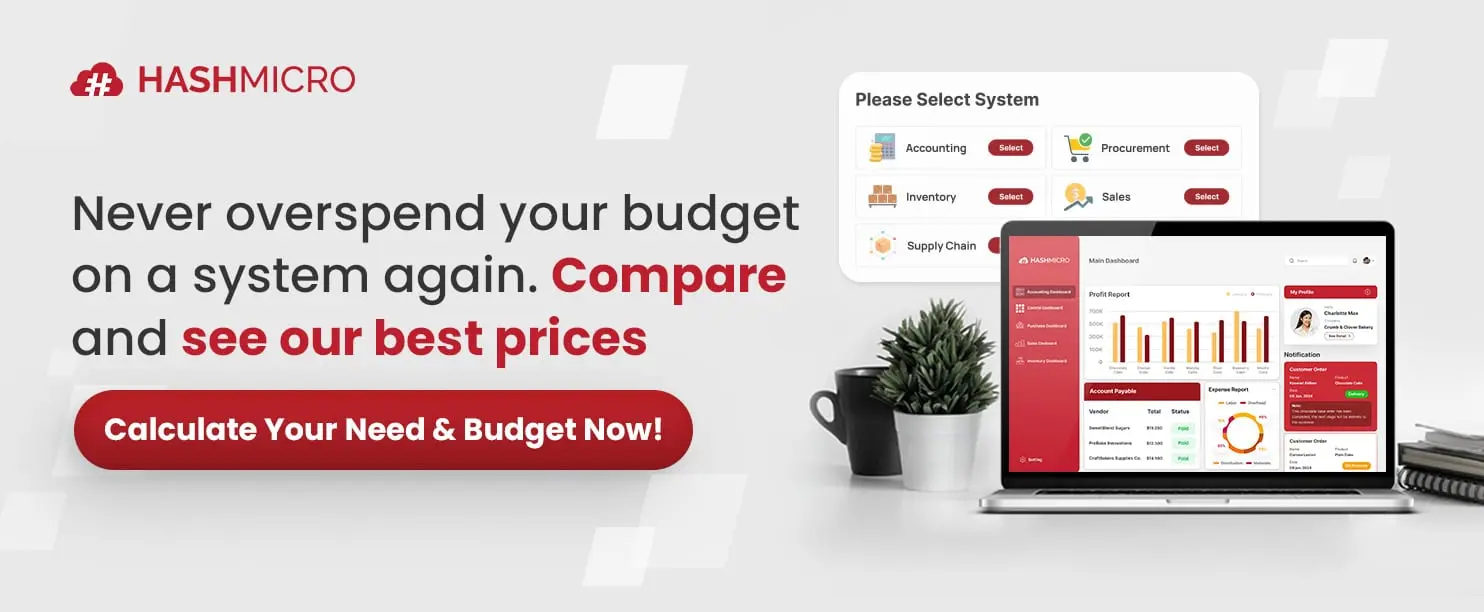What if your entire agricultural supply chain from field to fork could operate with the precision of a factory floor? That’s the value Agriculture Supply Chain Management (SCM) software brings to today’s agribusinesses.
With the agriculture SCM market growing rapidly, choosing the right software, such as Smart Agriculture Solution from HashMicro, can improve visibility, boost efficiency, and enhance your overall business resilience.
In this article, we explore eight trusted agriculture SCM solutions tailored for businesses in Malaysia.
Key Takeaways
|

Shortlisted Agriculture Supply Chain Management Software
Before we proceed to the list of recommendations, I have curated some of the best agriculture supply chain management software choices for businesses, based on features, relevance, and user experience.
Best because
The best end-to-end solution for all types of business needs
Best Because
Structured very logically and the UI is very user-friendly, which makes it easy to work with.
Best Because
Cognos analytics makes it easy to pull consistent reports from multiple data sources.
Best Because
Implementing the platform is straightforward, and their customer support is helpful and responsive.
What is Agriculture Supply Chain Management Software?
Agriculture Supply Chain Management (SCM) software is a digital solution designed to help agricultural businesses manage and optimize every stage of their supply chain from planning and procurement to production, storage, distribution, and sales.
This software provides real-time visibility, improves coordination between stakeholders, reduces waste, and ensures that products move efficiently from farms to end consumers.
It plays a crucial role in enabling agribusinesses to make data-driven decisions and respond more effectively to market demands and operational challenges.
Benefits of Agriculture Supply Chain Management Software
Managing the agricultural supply chain can be complex, but with the right software, businesses can gain control, improve efficiency, and stay competitive. Here are some key benefits of using agriculture supply chain management software.
- Increased efficiency: Automates key processes, reduces manual work, and helps streamline operations from farm to market.
- Better traceability: Tracks products at every stage, ensuring transparency, food safety, and compliance with regulations.
- Accurate demand forecasting: Uses data to predict demand, helping reduce waste and optimize production and inventory.
- Real-time insights: Provides up-to-date data and analytics to support faster, more intelligent decision-making.
- Lower costs: Identifies inefficiencies, reduces waste and spoilage, and lowers overall operational costs.
- Sustainability support: Helps manage resources more responsibly and track environmental impact for greener practices.
8 Best Agriculture Supply Chain Management Software in Malaysia
Finding the right agriculture software can significantly improve how agricultural businesses manage their supply chains. Here are eight of the best solutions available in Malaysia that help streamline operations and boost productivity.
1. HashMicro Agriculture Supply Chain Management Software
HashMicro is a trusted enterprise software provider known for delivering customizable solutions across various industries, including agriculture. Their Agriculture Supply Chain Management Software is designed to help agribusinesses gain better control over their day-to-day operations by improving workflow coordination, reducing manual errors, and increasing overall efficiency.
This software supports agricultural businesses in managing their supply chain from production to distribution, while ensuring that data and processes remain well-organized and accessible.
Whether managing small-scale farms or large commercial operations, the system provides a centralized platform that simplifies complex agricultural supply chain activities, helping businesses operate more strategically in a competitive market.
Key Features of HashMicro agriculture software:
- End-to-end supply chain integration: Enables seamless coordination between suppliers, producers, and distributors by connecting all parts of the supply chain in one centralized system.
- Financial and cost tracking: Offers integrated tools for budgeting, expense monitoring, and cost analysis to support more accurate financial planning and reporting.
- Reporting and analytics: Delivers detailed insights and visual reports to evaluate performance, identify inefficiencies, and support strategic planning.
- Mobile access and cloud-based system: Enables users to manage and monitor operations anytime, anywhere, through a secure cloud infrastructure and mobile-friendly interfaces.
| Pros | Cons |
|---|---|
|
|
HashMicro helps you manage every aspect of your business efficiently. To find the right plan that fits your agricultural needs and budget, visit HashMicro’s pricing page and explore our flexible pricing schemes below.

2. Trellis LTD SCM for Agribusiness Management
Trellis LTD offers an intelligent supply chain management solution built specifically for modern agribusinesses. The platform focuses on transforming agricultural data into actionable insights, enabling producers, processors, and distributors to make more informed and intelligent decisions.
By combining supply chain automation with AI-powered forecasting tools, Trellis supports end-to-end visibility and operational agility.
Key features:
- AI-driven forecasting
- Quality & compliance monitoring
- Scenario planning tools
| Pros | Cons |
|---|---|
|
|
3. IBM Corporation Agriculture System
IBM offers a comprehensive agriculture-focused supply chain solution centered around its IBM Food Trust and Watson Decision Platform for Agriculture.
While the core is its blockchain-powered Food Trust network, IBM extends its offering by integrating real-time environmental intelligence and AI-driven insights for agribusinesses.
Key features:
- Collaborative data sharing network
- Modular platform architecture
| Pros | Cons |
|---|---|
|
|
4. AgriDigital Agriculture SCM Software
AgriDigital Agriculture SCM Software is a trusted platform designed to streamline and support the agricultural supply chain, offering digital solutions that connect key players from the farm to the buyer.
Its structured approach helps agribusinesses manage operations more effectively across various stages of the supply process.
Key Features:
- Cloud-based grain management and transactions
- Automated contract and delivery management
- End-to-end traceability for supply chain participants
| Pros | Cons |
|---|---|
|
|
5. Agrivi SCM Agriculture Software
Agrivi SCM Agriculture Software is a robust solution crafted to digitize and synchronize the entire farming journey.
From field operations to financial tracking, it delivers unified data visibility that empowers agribusinesses to make informed decisions and maintain consistent operational oversight.
Key features:
- Farm activity planning and management
- Inventory and resource tracking
- Financial and budgeting oversight
| Pros | Cons |
|---|---|
|
|
6. ChainPoint Agriculture Software
ChainPoint Agriculture Software offers a flexible and scalable solution designed to enhance visibility and coordination within complex agricultural supply chains.
It enables organizations to manage supply chain data better and maintain transparency from origin to end product across various stakeholders.
Key features:
- Modules for compliance, sustainability monitoring, and reporting
- Cloud-based
- Highly configurable workflows and integration support
| Pros | Cons |
|---|---|
|
|
7. Bext 360 SCM Agriculture System
Bext 360 SCM Agriculture System is a comprehensive platform built to enhance transparency and sustainability across global agricultural supply chains.
It specializes in capturing and visualizing crucial data, such as worker compensation, environmental impact, and product origin, from farm to end consumer, thereby supporting efforts in traceability and accountability.
Key features:
- Sustainable metrics tracking
- Global deployment suitable for multiple commodity types
| Pros | Cons |
|---|---|
|
|
8. SourceTrace Agriculture SCM Software
SourceTrace Agriculture SCM Software delivers a thorough, data-driven platform that digitally transforms agricultural operations from farm to market.
It focuses on structuring and authenticating key agricultural data, including farming activities, certifications, provenance, and value chain transactions.
Key features:
- QR/barcode-based traceability linking produce to its origin
- Digital procurement and payment tracking
- Unified farmer and farm profile management with GPS‑enabled records
| Pros | Cons |
|---|---|
|
|
How to Select the Right Agriculture Supply Chain Management Software for Your Business
With a wide range of agriculture supply chain management software available in the market, selecting the one that fits your business can be challenging. To help you make an informed decision, here are five key factors to consider when choosing the right solution for your agricultural operations.
- Identify your operational needs: Clarify the key processes you want to optimize such as traceability, logistics, or compliance based on your supply chain model.
- Ensure ease of use: Choose software with an intuitive interface that’s accessible to both field workers and administrative teams.
- Check integration compatibility: The platform should easily integrate with your existing systems, such as accounting tools, IoT sensors, or farm management software.
- Evaluate scalability: Make sure the solution can grow with your business and support multiple locations, crops, or partners.
- Assess vendor support and training: Reliable customer service and thorough onboarding are crucial for a smooth transition and long-term success.
Conclusion
Adopting the right agriculture supply chain management software is a strategic step toward improving efficiency, transparency, and sustainability in today’s increasingly complex agribusiness landscape. Each solution highlighted offers unique strengths, but selecting a platform that aligns with your business goals is key.
HashMicro emerges as one of the most flexible and scalable options for agribusinesses in Malaysia, providing centralized control, real-time insights, and integrated automation across every stage of the supply chain.
Whether you’re managing crops, suppliers, or logistics, HashMicro helps streamline operations and support more intelligent decision-making.
To discover how HashMicro can transform your agriculture supply chain, you can request a free demo and experience its full capabilities tailored to your business needs.

FAQ Agriculture Supply Chain Management Software
-
What are the four major types of SCM software?
Key types include Inventory Management Software for stock control, Transportation Management Software (TMS) for logistics, Warehouse Management Software (WMS) for order fulfillment, and Supplier Relationship Management (SRM) for supplier interactions.
-
Can AI be used in agriculture?
Applications and solutions that utilize AI in agriculture have been developed to support farmers in precise and regulated farming practices by providing them with tailored advice on water management, crop rotation, timely harvesting, crop selection, optimal planting, pest management, and nutrition management.
-
What technology is used in agriculture?
Today’s agriculture routinely employs sophisticated technologies, including robots, temperature and moisture sensors, aerial imagery, and GPS technology. These advanced devices, combined with precision agriculture and robotic systems, enable businesses to be more profitable, efficient, safer, and environmentally friendly.
-
What are the challenges in Agricultural Supply Chains?
Agricultural supply chains in Malaysia face several challenges, including fragmented distribution networks, inconsistent product quality, and limited access to modern technology among smallholder farmers. Inefficient logistics and inadequate cold chain infrastructure often result in post-harvest losses, particularly for perishable goods.
































